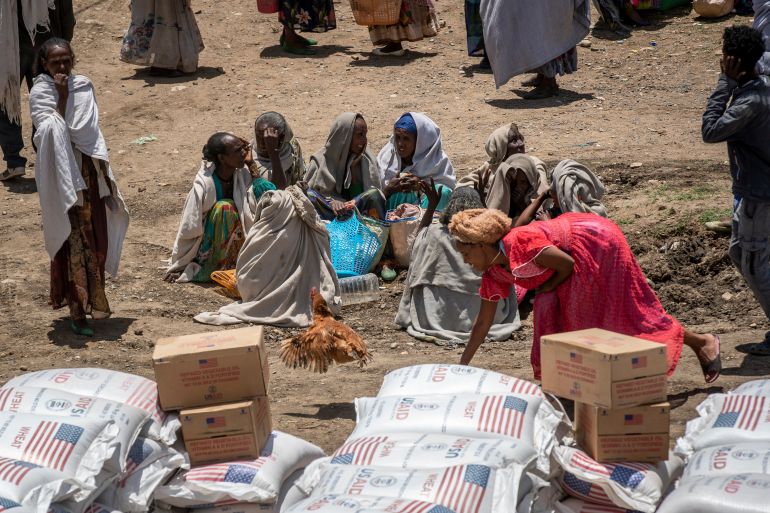Almost 40% of Tigrayans suffer ‘extreme lack of food’, WFP warns
UN agency sounds alarm about a record nine million people in need of food aid across all three conflict-hit regions of northern Ethiopia.

Almost 40 percent of people in Ethiopia’s embattled Tigray region are suffering “an extreme lack of food” following 15 months of fighting, the World Food Programme (WFP) has said, also sounding the alarm about rising hunger in neighbouring Amhara and Afar regions.
The dire figures announced on Friday were included in the United Nations agency’s latest food security assessment, which says “severe hunger” was tightening its grip in northern Ethiopia.
Keep reading
list of 4 itemsUS report finds possible Israeli violations of international law in Gaza
South Africa asks ICJ to order Israel to withdraw from Gaza’s Rafah
‘It’s not human’: What a French doctor saw in Gaza as Israel invaded Rafah
In Tigray, a region of some six million people that the UN says largely remains under a de facto blockade, “families are exhausting all means to feed themselves, with three-quarters of the population using extreme coping strategies to survive”, the WFP’s report (PDF) said.
It warned that 83 percent of Tigrayans were food-deprived, noting increases in begging and relying on just one meal a day.
🚨 NEWS ALERT 🚨
A new @WFP assessment shows almost 40 percent of Tigrayans are suffering an extreme lack of food. Across north #Ethiopia more than 9 million people are in need of humanitarian food assistance, the highest number yet 👇 https://t.co/W9SopKmXK3 pic.twitter.com/YkGnyglyWD
— WFP Media (@WFP_Media) January 28, 2022
Ethiopia’s war broke out in November 2020 following months of mounting tensions between Prime Minister Abiy Ahmed’s government and the Tigray People’s Liberation Front (TPLF), the former governing party of Tigray which once dominated national politics.
Abiy had declared victory over the Tigrayan forces on November 28 after federal forces captured Tigray’s capital, Mekelle, but fighting dragged on. Within months, the tide of war turned and the Tigrayan forces eventually regained most of the territory they lost before launching counteroffensives in the neighbouring Amhara and Afar regions.
The war, which has killed an estimated tens of thousands of people and forced millions from their homes, has shifted in recent weeks, with the Tigrayan forces retreating into their region after attempting to advance on the capital, Addis Ababa, and Ethiopia’s military saying it would not pursue them further. That opened the way for fresh mediation efforts by the United States and the African Union, with humanitarian access a key goal.
Meanwhile, the UN humanitarian agency said in an update on Friday less than 10 percent of the needed supplies, including medicines and fuel, have entered Tigray since mid-July. All international NGOs operating in Tigray have depleted their fuel, “with their staff delivering the little remaining humanitarian supplies and services on foot, where possible”.
Abiy’s government has blamed problems with aid delivery in part on insecurity it says is caused by Tigrayan forces, including new fighting in Afar near the only approved road corridor for aid.
Aid workers, however, also blame bureaucratic obstacles including intrusive personal searches and confiscation of items including personal medications before visits to Tigray. The new WFP report, based on face-to-face interviews with more than 980 households across accessible parts of Tigray, cited “extraordinary operation challenges”.
Aid has begun reaching people in the Amhara and Afar regions after Tigrayan forces’ incursions there displaced hundreds of thousands. But the new WFP report said a record nine million people need food assistance across the three war-affected regions.
In Amhara, “hunger has more than doubled in five months because the region bore the brunt of recent fighting” between the Ethiopian army and Tigrayan forces, WFP said. “More than 14 percent of children under five and almost a third of pregnant and breastfeeding women are malnourished,” it added.
In Afar, conflict-driven displacement is pushing hunger and malnutrition rates up, the agency said, warning that heavy fighting on the Tigray-Afar border in recent days “is expected to force more communities from their homes and deeper into hunger”.
Ethiopia’s foreign ministry this week said it was working with aid partners to facilitate daily cargo flights to Tigray “to transport much-needed medicines and supplies”. It is not clear when the daily flights will begin, though the International Committee of the Red Cross on Wednesday announced that it had made its first delivery of medical supplies to Tigray since September, calling it “a huge relief”. A second flight followed on Thursday.
Update: We’ve just delivered lifesaving medical supplies into Mekelle, #Tigray, for the first time since September.
We work on organizing other flights carrying medical assistance in the coming days and weeks. pic.twitter.com/Epdox5FEEn
— ICRC (@ICRC) January 26, 2022
The UN has warned time is running out.
“Aid organisations have warned that operations could cease completely by the end of February in Tigray,” spokesman Stephane Dujarric told reporters on Thursday.
Tigray’s health bureau this week reported that nearly 1,500 people died of malnutrition in just part of the region over a four-month period last year, including more than 350 young children. It cited more than 5,000 blockade-related deaths in all from hunger and disease in the largest official death toll yet associated with the country’s war.